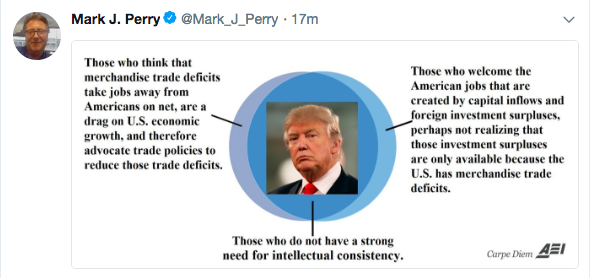AEI on Merchandise Trade Deficits
I follow Perry on Twitter and saw this:
So, standard disclaimers: Trump’s policies on trade are awful, and his framing of the issues when he speaks to the public is also terrible. His policies, other things equal, will make Americans poorer, and he conveys a very confused understanding of the topic.
Having gotten that out of the way, I think there is a basic mistake in the above treatment of (merchandise) trade deficits and capital inflows (on the level of, I might have put it as a bonus question on an Econ 201 exam). Which is awkward if it occurs in the midst of mocking someone for not being intellectual on trade.
(To be clear, I’m sure the economists at AEI are aware of the nuance I’m referring to. My point is just, you probably shouldn’t make a basic mistake in the midst of lecturing Trump on trade.)
I’m bogged down with day job stuff right now so I’ll see if any of you know what I mean…








Some part of the merchandise deficit is funded by Americans increasing their level of debt to foreigners. While this is equivalent to the purchase of an asset as far as foreigners are concerned its not really clear that it does much for American jobs. While the Perry quote does not actually say that all the merchandise deficit is magically turned into beneficial job-creating inward investment it does nothing to dispel that notion.
Government bonds are not investment.
When China buys US Treasuries, the money just gets spent on consumption like food stamps or free health care. It doesn’t get spent building factories, or laboratories. There is no genuine investment happening. Some of that government money gets spent on “education” but overall I think the main government contribution has been to put more effort into national conformity rather than encouraging students to learn anything.
Everyone should read the chapter “The Medicare Ponzi Scheme” from the book “Primal Prescription”.
A dollar borrowed from overseas is a dollar less in product sales or investment from overseas. Another good reason to reduce the deficit.